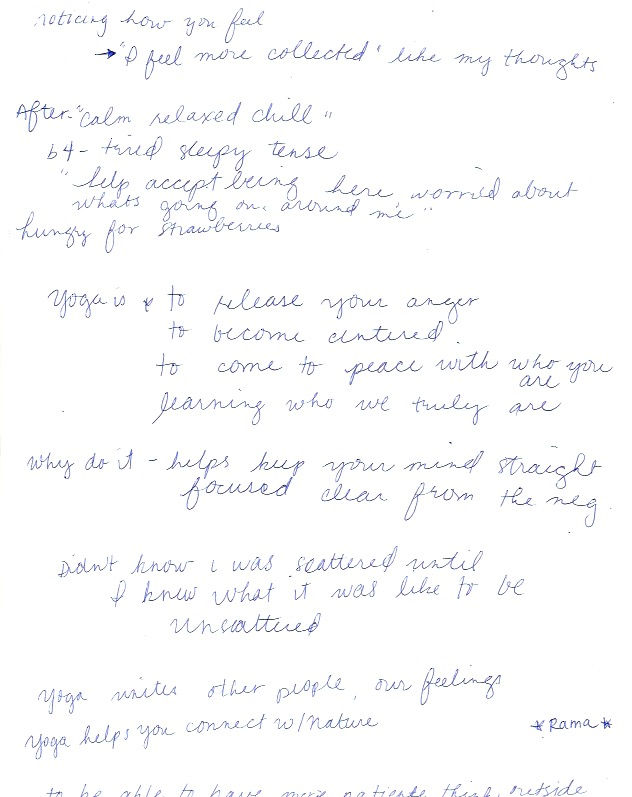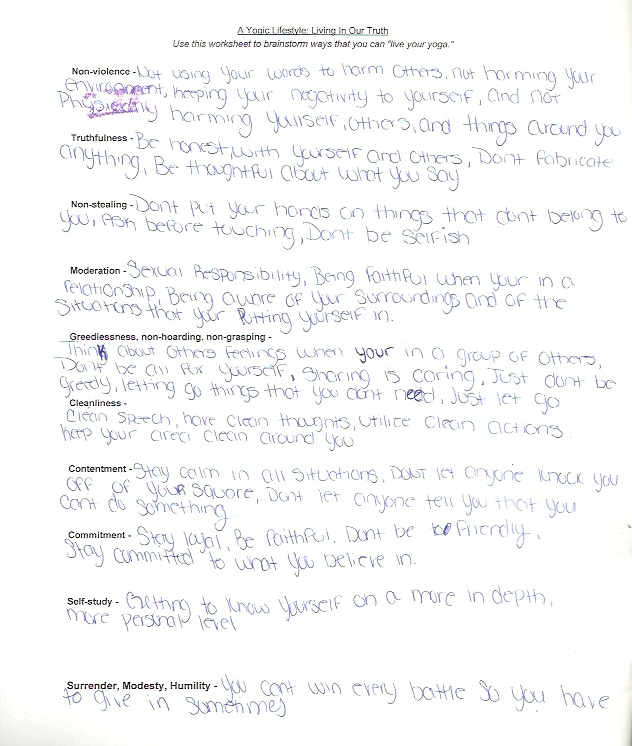Detention Lesson Plan: Intro to the Philosophy of Yoga
- Alexis Donahue
- Aug 3, 2015
- 4 min read
It’s more than just twisting your body into pretzel-like positions and middle aged ladies in tight pants!
Objective:
Sattva (balancing) yoga & breathing practice to increase body and energy awareness.
Learning the 10 basic principles of yoga philosophy.
Discussion of how adhering to these practices could positively impact our bodies, minds, and lifestyle.
Cultivating mindfulness, respect for self, and others.
Examining perception: Are our opinions of unfamiliar concepts skewed?
Community building with the breaking of bread (Homemade mac & cheese, kale chips, and dessert).
Activity 1: Introduction & check in. Name your energy.
Activity 2: Establishing boundaries for a safe space.
Activity 3: Short yoga practice & guided “cave meditation”.
Activity 4: Check back in: Has your energy changed after practicing yoga?
Activity 5: Breaking of bread, mindful eating exercise.
Activity 6: Open up the floor for Q&A about yoga, breathing, meditation, etc.
Activity 7: Explain the literal meaning & ultimate goal of yoga.
Activity 8: Discussion of the yamas & niyamas.
Activity 9: Yama & niyama worksheet.
Activity 10: Group sharing of worksheet.
Activity 12: Dessert & reflection.
Yama and Niyama are ten commitments of attitude and behavior. One set of disciplines (niyama) is meant to improve the human personality and the other (yama) is meant to guide our relationships and interactions with other beings in the world. Thus yoga is an education for both internal and external growth.
Yoga: Union, Bind, Connect, Yolk, Unite
The most important teaching of yoga has to do with our nature as human beings. It states that our "true nature" goes far beyond the limits of the human mind and personality--that instead, our human potential is infinite and transcends our individual minds and our sense of self. Yoga is the practical science intended to help human beings become aware of their ultimate nature. ~ Bhole Prabhu
Freedom - which is defined by T.K.V. Desikachar as "the absence of the consequences from obstacles and the avoidance of actions that have distracting or disturbing effects" - is the ultimate goal of yoga.
Group discussion questions included: What do you need to feel like you’re in a safe space? Has your energy changed after practicing yoga? What do you think yoga means? What’s the first thing that comes to your mind when you think of yoga? Why would you practice yoga? Why would you suggest that others should practice yoga? Since we now know that the literal meaning of yoga is union/connection/uniting, what do you think yoga connects to, what does it join together, what does it unite? What do you think the ultimate goal of yoga is? If the ultimate goal of yoga is freedom, what does that mean for you? What does freedom mean? What are obstacles? What are consequences? How can obstacles lead to consequences, both good & bad? Can we begin to see obstacles in our lives as opportunities and, if so, in what ways? Are there any actions in your life that have had distracting or disturbing effects? If so, what could we do in the future to avoid these actions and the negative consequences that they’ve created for us? What does non-violence mean? What does truthfulness mean? What does non-stealing mean? What does moderation mean? What does greedlessness mean?
After class notes: After consulting with the supervisor, we decided to make the workshop optional this week due to the fact that we were starting with an Introduction to Yoga practice in the gym. All of the kids were informed that they had a choice to attend or to sit out. All of the kids (#7) elected to attend and fully participate in the workshop, even those who have previously refused to participate in any of the weekly detention yoga classes. Staff report that our Friday Grains, Brains, and Tissues Cooking Workshop is something that they look forward to every week. Thanks to the encouragement to step outside of their comfort zone and the willingness to try new foods from week to week, they were primed to give yet another new concept a try.
During the group discussion period in the multi-purpose room, all of the kids reported a drastic change in their energy, thoughts, minds, bodies, and/or emotions after only 20 minutes of gentle restorative yoga and mindful breathing.
All of the kids spoke up, asked and/or answered questions, and contributed to the conversation about the meaning and ultimate goal of yoga. All of the kids participated in the plain English group discussion about the Yamas and Niyamas. My co-teacher, Brianne Murphy, took notes while the kids opened up about their thoughts and personal philosophy. All of the kids utilized their Yogic Lifestyle Worksheet in some capacity. A few wanted to share their thoughts and observations with us and allowed me to take their completed worksheets home to make copies.
All of the kids wanted to keep their handouts. Books about yoga philosophy and mindfulness were brought in for kids to flip through. Two boys requested to borrow two different books, Buddhist Boot Camp by Timber Hawkeye and We're All Doing Time by by Bo Lozoff. They both promised to return them to us at next week’s yoga class. All of the kids say that they will be coming to AHHAH’s yoga classes from now on.
The Cave Meditation from The Spirit of Yoga
Imagine a cave within yourself.
A fire flickers.

On your right is Anger. Sadness is to his left.
Greed sits across the circle talking to Joy and Jealousy.
Some in the group are loud and strident, blustery, and strong.
Others are weaker, skinnier, with whispery voices.
It is difficult to make head or tail of what is going on.
They are your thoughts, desires, moods, judgments.
Ego, will, intellect.
This is what you think of as you.
But they are not you.
While your guests are parts of your mind, they do not control or own you.
They need attention and understanding in equal measure.
They need acknowledgment without involvement.
Do not follow the conversation of one over the other.
Validate each one for what it is.
Learn to befriend your inner landscape with respect and compassion.
Learn to step back and be a journalist of your own mind.
Notes From Group Discussion

*Cut off text reads: to be able to have more patience, think outside the box, to relax.

Completed Worksheets






























Comments